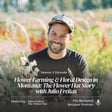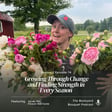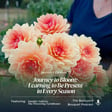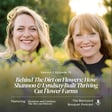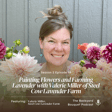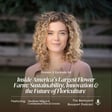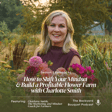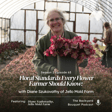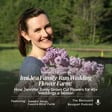
Ep.16: Blooming in the Cold: How to Grow a Vibrant Cut Flower Garden in Zone 2B
Madeline Cooper left behind city life when she traded in her stilettos for muck boots to flower farm in zone 2b. She’s now the soul behind Fraiche Flower Farm in Alberta, Canada. Madeline’s journey from fashionable glam to the gritty charm of flower farming reveals a world where pink blooms and sweet peas flourish under her nurturing care.
In this episode, Madeline recounts her move to Alberta and how her initial hobby of gardening blossomed into a thriving, organic flower farm. She shares her transition from high heels to garden boots, embracing the rural life with a spirit that infuses her farm with joy and community connection.
Listen to this episode to gain insights into the challenges of cold-climate gardening, including tips on growing ‘cool flowers,’ overwintering techniques, and the value of perennials. Madeline’s innovative approach, from her detailed research to practical pest management, exemplifies her dedication to sustainable farming.
Madeline’s story is not just inspiring but also a practical guide for anyone looking to navigate the complexities of flower farming in harsh climates.
Join us as Madeline Cooper from Fraiche Flower Farm shares her flower farming journey on the Backyard Bouquet Podcast, offering a glimpse into the life of a woman who transformed her passion for flowers into a beacon of beauty and resilience in the world of cut flower farming.
In this episode, you’ll hear about:
00:02:25 - Madeline's Journey to Flower Farming
00:04:10 - Adjusting to a New Climate
00:06:04 - Land Utilization and Challenges
00:08:04 - Growing Flowers In A Short Growing Season in Zone 2B
00:10:39 - Overwintering Flowers in Zone 2B
00:13:27 - Madeline's Peony Collection
00:14:52 - Importing Plants to Canada
00:16:29 - Protecting Roses Over Winter
00:18:34 - Growing Cool Flowers Like Sweet Peas
00:20:09 - Impact of Drought on the Farm
00:21:13 - Pulse Watering Technique
00:22:48 - Sweet Peas and Pink Flowers
00:28:57 - Breeding Cosmos
00:31:20 - The Story Behind Fresh Flower Farm's Name
00:39:17 - Using High Brix Molasses
00:41:58 - Hosting Events on the Farm
00:43:04 - Integrating Other Passions with Flower Farming
Learn more about Madeline Cooper and Fraiche Flower Farm:
- Visit Fraiche Flower Farm: www.fraicheflowerfarm.com/
- Follow Fraiche Flower Farm on Instagram: www.instagram.com/fraicheflowerfarm
***Rate, Review, & Follow The Backyard Bouquet***
If you enjoyed this episode, will you please consider leaving the podcast a review? Your review helps make the podcast more discoverable to others and allows me to continue creating more episodes. I'd love to know what you enjoyed most about the episode.
New episodes every Tuesday to help keep your garden blooming!
JOIN THE BACKYARD BOUQUET COMMUNITY ON FACEBOOK
https://www.facebook.com/groups/cutflowergardening
Sign up for my newsletter: https://thefloweringfarmhouse.myflodesk.com/nlw4wua8s3




